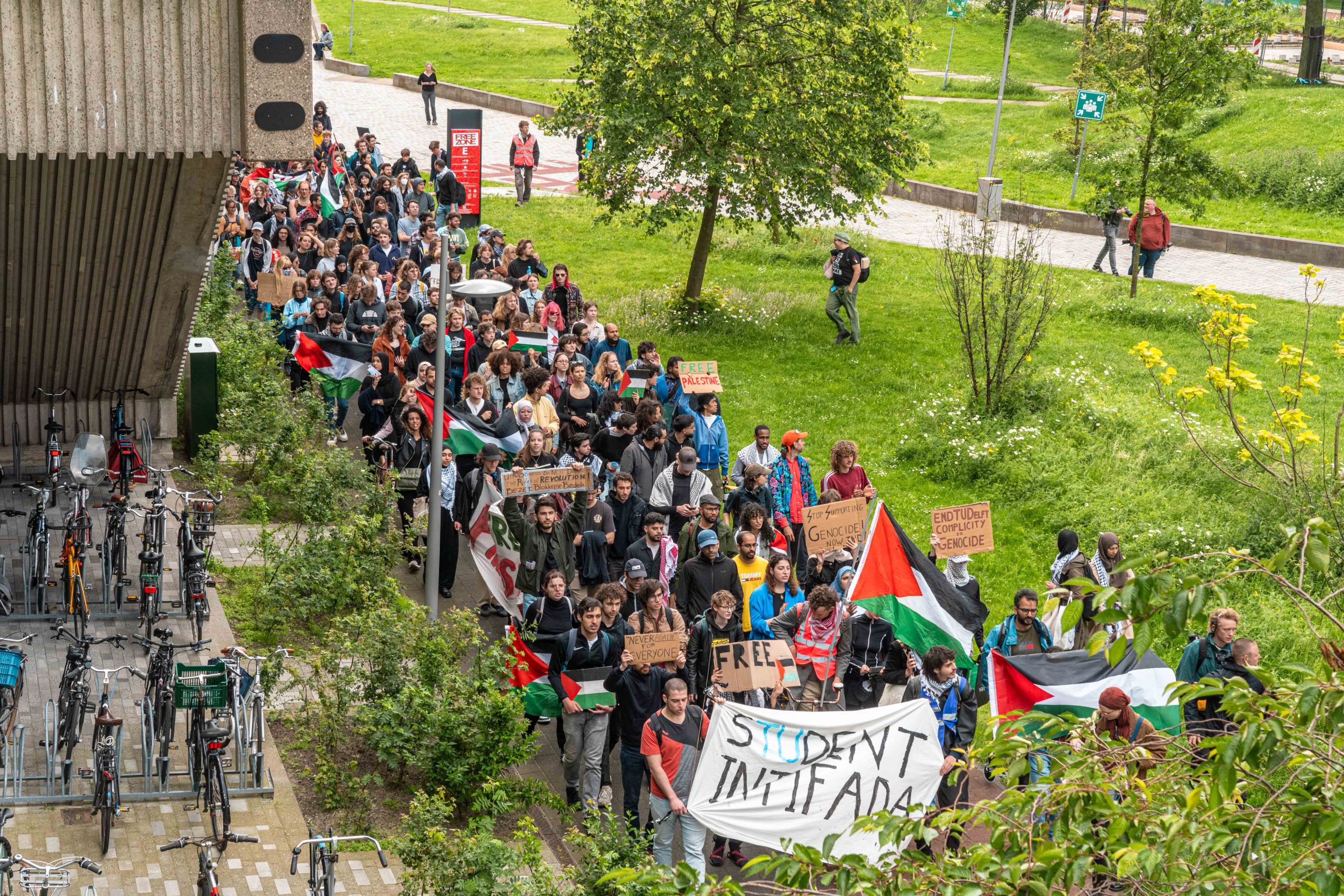After TU Delft announced that it will not reconsider its ties with Israeli universities on Wednesday, the demonstrators ratcheted up their fourth protest on Thursday. “We get the feeling that this is really needed.”
A pro-Palestinian protest march was on its way to the Library in May 2024. (Photo: Thijs van Reeuwijk)
For a while it looked like the protest on Thursday would be similar to that of last week. Gathering at the Free Zone at EEMCS, marching to the Library, and dispersing within an hour. But when the march reached the Library, protesters wearing balaclavas joined the group and started pulling out tents. There is now a tented camp on the sloping, grassy roof of the Library. The group of protesters is larger than before, and some of them have covered their faces. They intend to stay until their demands are met.
One day previously, four protesters sat around the table with Vice-Rector Magnificus Rob Mudde and ME Dean Fred van Keulen. In that meeting, Mudde made clear that he sees no benefits in breaking those ties. He said that these are only individual collaborations and individuals have the right to work with any other academics, including Israelis. TU Delft will not “take sides”, the administrator said to the activists. “It is not for us to take a political position.”
Shortly after the meeting, the Executive Board issued a public statement on TU Delft’s website for the first time since the protests started. In the statement, it says that it supports a ceasefire, but also that it does not believe that ending or suspending all contact with academic institutions is a solution.
- Also read our liveblog on the pro-Palestinian tented camp on the roof of the Library.
Moral deliberation
The Executive Board believes that “it is important to keep the dialogue with students and colleagues from conflict areas open as they can help bring about change”. The Executive Board also says that it wants to organise a moral deliberation
TU Delft will not produce a list of partnerships
The Executive Board also pays no heed to the call for transparency. It says that this would jeopardise the safety of individual academics. In the statement, the Executive Board points to the CORDIS system which lists European partnerships and which is hard to decipher. It says that anyone wishing to find out who TU Delft works with on European research projects may refer to the website. The board will not produce a list of partnerships.
In response, the protesters decided to set up a tented camp, as students at universities such as Groningen and Maastricht have done. Master’s student Tim (24) says that they had assumed that their demands would not be met. He intends to sleep in one of the tents and will only leave when the Executive Board meets the list of demands.
The protesters believe that this is necessary. In the meeting on Wednesday, Mudde continued to push the importance of independent academic freedom. But the protesters said that individuals at Israeli universities may not take personal standpoints at all, and that their academic institutions are “proud of their collaboration with the Israeli army”.
Maya Wind
They gave Mudde the recently published book by Maya Wind called Towers of Ivory and Steel. In the book, the Israeli anthropologist reveals the role of Israeli universities in Palestinian oppression. At the invitation of the united student action groups, the author was in the Netherlands last week for a book tour and visited some universities. She did not come to TU Delft.
At the end of the meeting, one of the protesters, who comes from Israel, asked Mudde if he was “aware that the Israeli army, with the help of Israeli universities, is guilty of genocide and apartheid”. “Yes” was Mudde’s answer.
For Mudde, the freedom of individual academics is of greatest concern
The Vice-Rector says that partnerships are always with individual researchers and not at institutional level. For Mudde, the freedom of individual academics is of greatest concern. But this is not black and white, believe the protesters. “Even if they are the cleverest people in the world with the best intentions, some of the money will go on murdering people.”
Safety
Safety on campus was also a subject in the meeting. The Executive Board says that it is receiving signals “from everywhere” about “feelings of intimidation and feeling unsafe”. One of the protesters, a representative of BK Scholars for Palestine who wishes to remain anonymous (the name is known to the Editorial Office), countered this by saying that feeling unsafe also goes the other way around. The group organised a dialogue about the destruction in Gaza in April that was cancelled at the last minute by the Dean on the grounds of safety.
“Did you ask them why the complainants feel intimidated?”, she asked Mudde and Van Keulen. “We are only stating the facts.” There needs to be room at TU Delft to talk about the issue based on facts, she says.
Other universities
There are or have been protests at many universities in the Netherlands. In Maastricht, six students even went on a hunger strike, three of whom continued until last Wednesday evening. The administrative bodies at all 14 universities are or were in discussion with protesters. Some of them have since shared information on partnerships, and some of the art academies have said that they will break or suspend ties.



Comments are closed.